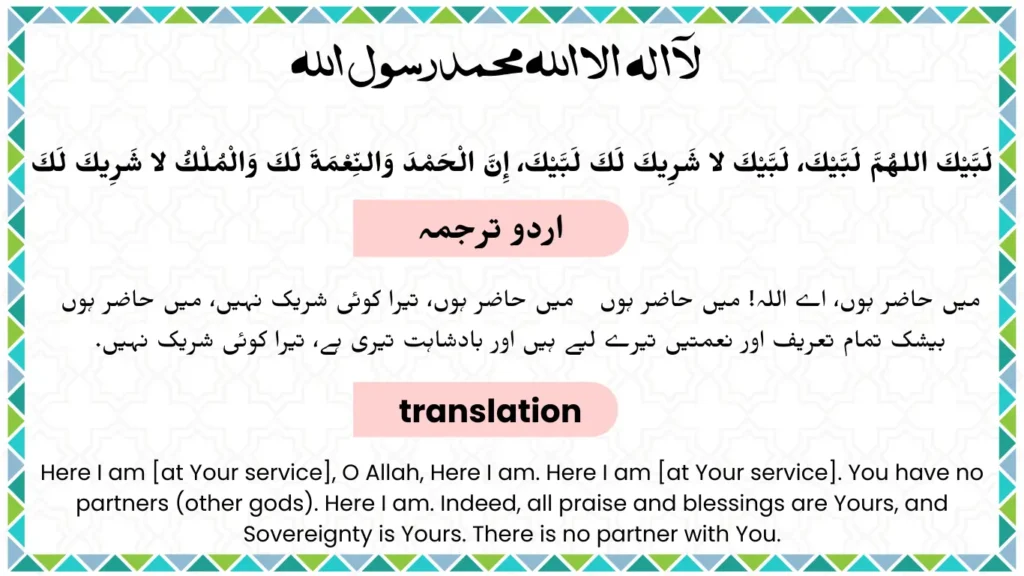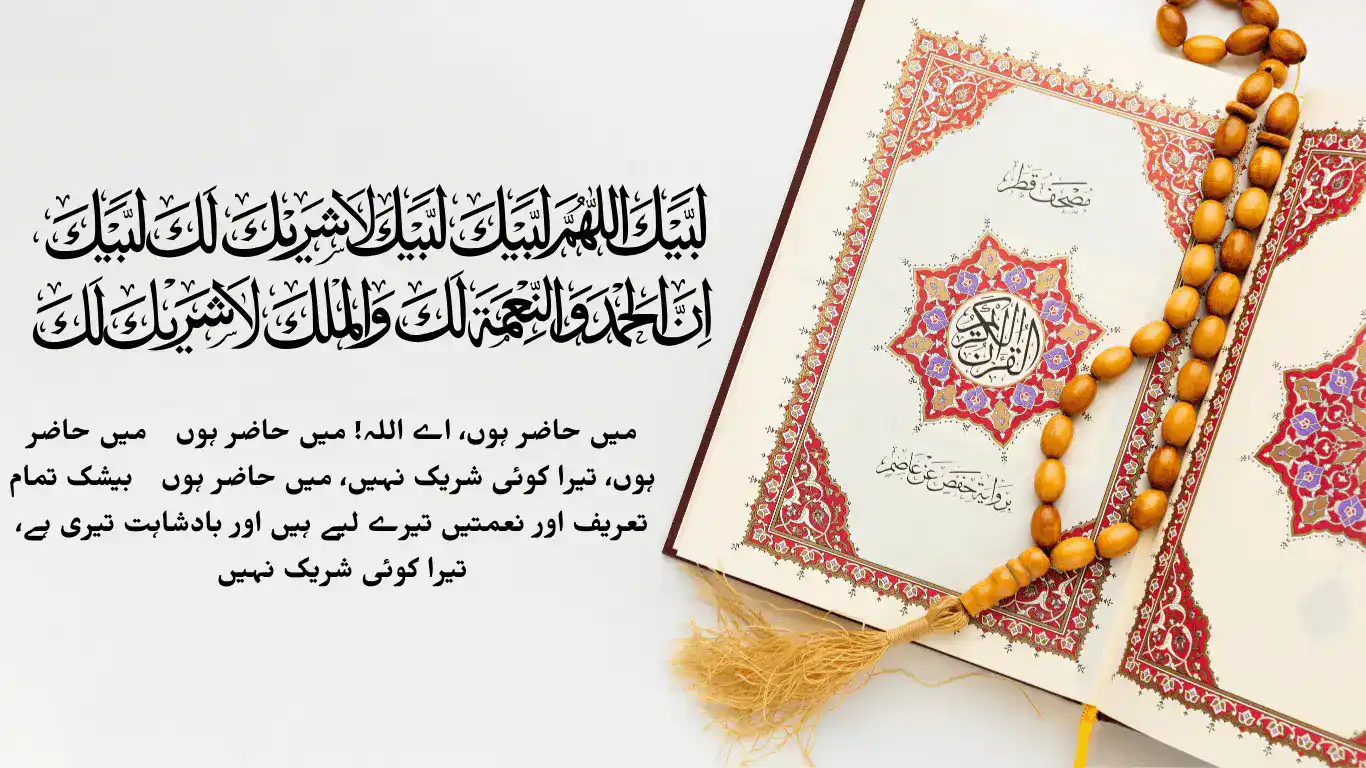Labaik Allahuma Labaik is a deeply spiritual phrase recited by Muslims during the pilgrimage of Hajj. This heartfelt expression, meaning Here I am, O Allah, here I am, symbolizes complete submission to Allah and represents the pilgrim’s readiness to fulfill the sacred duty of Hajj. This phrase is part of the Talbiyah, an important supplication made during Hajj and Umrah.
In this article, we will explore the meaning of Labaik Allahuma Labaik in Arabic, its significance in Islam, and how this profound phrase brings Muslims closer to Allah during their spiritual journey.
Labaik Allahuma Labaik in Arabic Text
The phrase Labaik Allahuma Labaik is written in Arabic as follows:
لَبَّيْكَ اللّهُمَّ لَبَّيْكَ
This powerful supplication continues with additional phrases, forming the complete Talbiyah:
لَبَّيْكَ لَا شَرِيكَ لَكَ لَبَّيْكَ، إِنَّ الْحَمْدَ وَالنِّعْمَةَ لَكَ وَالْمُلْكَ، لَا شَرِيكَ لَكَ
Translation of Labaik Allahuma Labaik
In English, this translates to:
O, Allah, Here I am, O Allah, here I am. Here I am, there is no partner with You. Indeed, all praise, grace, and sovereignty belong to You. You have no partner.
In Urdu, the translation is:
“حاضر ہوں، اے اللہ، حاضر ہوں، حاضر ہوں، آپ کا کوئی شریک نہیں، تمام تعریفیں اللہ کے لیے، نعمتیں اور بادشاہت اللہ کے لیے ہیں، آپ کا کوئی شریک نہیں۔”

The Significance of Labaik Allahuma Labaik
The recitation of Labaik Allahuma Labaik is a declaration of one’s dedication to Allah. Muslims repeatedly chant this phrase while in a state of Ihram, a special state of purity, as they approach the holy sites of Mecca. The phrase is not just a verbal utterance, but a spiritual cry from the heart, symbolizing the pilgrim’s readiness to obey Allah’s command.
- Submission to Allah’s Will: The word “Labaik” means “I am present” or “I am here to obey.” It reflects the pilgrim’s willingness to fulfill the duties of Hajj and submit entirely to Allah’s will.
- Unity of Allah: The phrase “La sharika lak” (You have no partner) emphasizes the Tawhid or oneness of Allah, reinforcing the central belief in Islam that Allah is the only one worthy of worship.
- Gratitude and Praise: The Talbiyah acknowledges that all blessings, grace, and dominion belong to Allah alone, reminding the believer of their humble position before the Creator.
| Hasbunallah wanikmal wakil meaning in urdu |
| Watu Izzu Mantasha Watu Zillu |
| Warafana laka zikrak tarjuma |
| Surah Baqarah last 2 Ayat with Urdu translation |
Spiritual Benefits of Reciting Labaik Allahuma Labaik
Reciting Labaik Allahuma Labaik brings a deep sense of spiritual fulfillment and humility. Here are some of the spiritual benefits associated with this beautiful phrase:
- Connection with Allah: The constant recitation during Hajj and Umrah strengthens the pilgrim’s bond with Allah, filling their heart with faith and reliance on Him.
- A Reminder of Purpose: By chanting this phrase, Muslims are reminded of their higher purpose in life, which is to worship and serve Allah.
- Purification of the Soul: Repeating the Talbiyah cleanses the heart from worldly attachments and allows the pilgrim to focus solely on their devotion to Allah.
Labaik Allahuma Labaik: When and How It Is Recited
Labaik Allahuma Labaik is recited after entering into the state of Ihram, the sacred state of purity required for performing Hajj or Umrah. Pilgrims begin reciting this phrase once they cross the Miqat, the boundary marking the limits of the Holy City of Mecca.
Throughout the journey, from the Miqat to the Kaaba, pilgrims continue to chant the Talbiyah as an affirmation of their readiness to follow Allah’s command. The phrase is repeated several times during the rites of Hajj and Umrah, and pilgrims are encouraged to keep reciting it as often as possible.
Why Labaik Allahuma Labaik Holds a Special Place in the Hearts of Muslims
For Muslims, Labaik Allahuma Labaik represents the purest form of submission to Allah. It encapsulates the essence of faith, where the believer willingly proclaims their presence and readiness to follow Allah’s commands, leaving behind worldly concerns. This sacred phrase is more than just words – it is an expression of love, devotion, and complete reliance on Allah.
The Emotional Connection
The recitation of the Talbiyah stirs deep emotions in the hearts of Muslims. It evokes feelings of humility, love, and gratitude towards Allah. For many pilgrims, hearing and reciting Labaik Allahuma Labaik brings tears of joy, as they feel spiritually closer to their Creator and witness the grandeur of the journey they are undertaking.
Conclusion
Labaik Allahuma Labaik in Arabic is a phrase that transcends time and culture. It represents a universal call to Muslims to answer Allah’s invitation to worship Him with full devotion and submission. Whether you are preparing for Hajj or Umrah or simply reflecting on the power of this phrase, Labaik Allahuma Labaik serves as a constant reminder of our purpose in life – to worship and glorify Allah alone.
May Allah accept the Talbiyah and the acts of worship of all those who sincerely recite Labaik Allahuma Labaik in their hearts.
FAQs:
Labaik Allahuma Labaik” means “Here I am, O Allah, here I am.” It is a declaration of obedience and submission to Allah, recited by Muslims during Hajj and Umrah.
Muslims begin reciting the Talbiyah, which includes “Labaik Allahuma Labaik,” after entering the state of Ihram and continue chanting it throughout the rites of Hajj and Umrah, especially as they approach the holy city of Mecca.
Reciting “Labaik Allahuma Labaik” symbolizes a Muslim’s readiness to obey Allah’s commands and fully submit to His will. It also reinforces the belief in the oneness of Allah and purifies the heart from worldly distractions.



